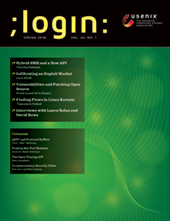
Practical Perl Tools: Top of the Charts
;login: Enters a New Phase of Its Evolution
For over 20 years, ;login: has been a print magazine with a digital version; in the two decades previous, it was USENIX’s newsletter, UNIX News. Since its inception 45 years ago, it has served as a medium through which the USENIX community learns about useful tools, research, and events from one another. Beginning in 2021, ;login: will no longer be the formally published print magazine as we’ve known it most recently, but rather reimagined as a digital publication with increased opportunities for interactivity among authors and readers.
Since USENIX became an open access publisher of papers in 2008, ;login: has remained our only content behind a membership paywall. In keeping with our commitment to open access, all ;login: content will be open to everyone when we make this change. However, only USENIX members at the sustainer level or higher, as well as student members, will have exclusive access to the interactivity options. Rik Farrow, the current editor of the magazine, will continue to provide leadership for the overall content offered in ;login:, which will be released via our website on a regular basis throughout the year.
As we plan to launch this new format, we are forming an editorial committee of volunteers from throughout the USENIX community to curate content, meaning that this will be a formally peer-reviewed publication. This new model will increase opportunities for the community to contribute to ;login: and engage with its content. In addition to written articles, we are open to other ideas of what you might want to experience.

I sometimes wonder if the people who make statements about Perl’s health in the world (some nostalgic, some a little more mean-spirited) have a sense of just how vibrant the Perl world is. I wonder whether seeing some of the interesting things being developed even as we speak or the range of projects available would change their thinking.
This leads to a good question: how do you find out about the interesting things happening in Perl on a week-to-week basis? In this column I’d like to focus on one of the answers to that question: the weekly reports that are published about modules.
We’ll look at three of them and for fun pick and consider interesting modules from each. All three of these listings are published each week on a blog created by Spanish Perl hacker Miguel Prz (“NICEPERL”), which can be found at http://niceperl.blogspot.com. Before we dive in, I should mention that these listings came to my attention thanks to the lovely newsletter started by Gabor Szabo called Perl Weekly. You can sign up and find past issues at http://perlweekly.com.
